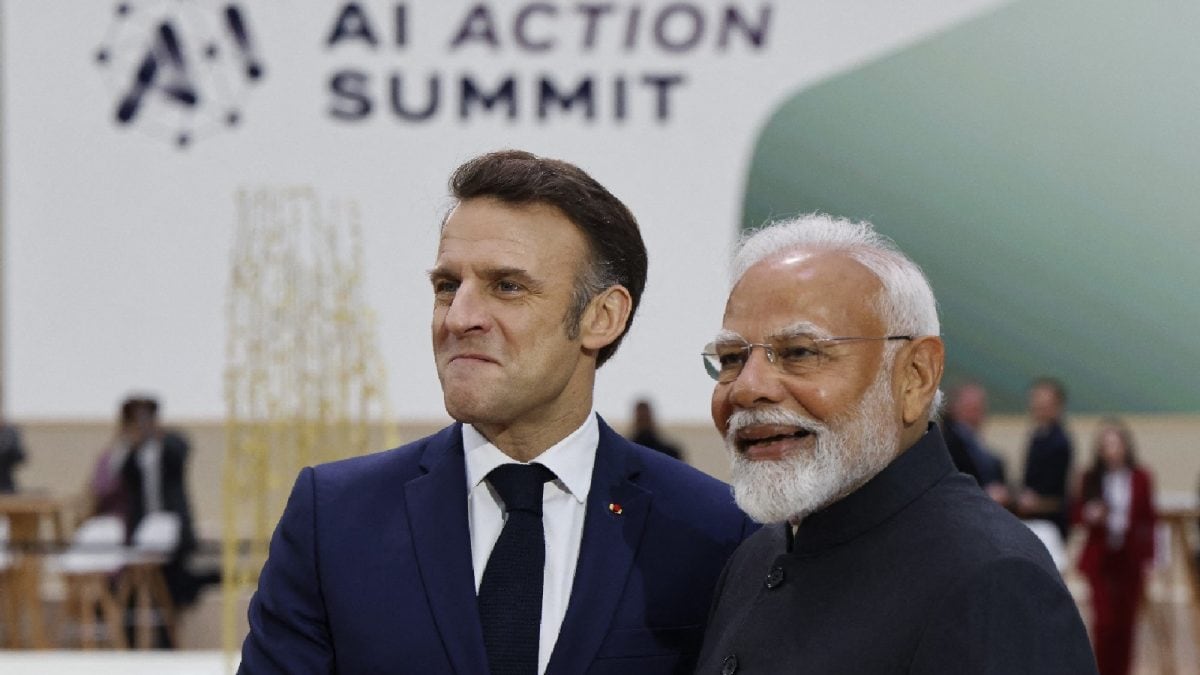ARTICLE AD BOX
Last Updated:November 07, 2025, 01:10 IST
US President Donald Trump said that the case was the most important case in the history of the country.

US President Donald Trump gestures as he speaks during an event to announce a deal with Eli Lilly and Novo Nordisk to reduce the prices of GLP-1 weight‑loss drugs, in the Oval Office at the White House in Washington, DC, US.
US President Donald Trump on Thursday said that foreign countries do not want him to win the case where the US Supreme Court is examining the US President’s use of emergency powers to impose “reciprocal" tariffs on nearly every US trade partner.
The remarks come after a majority of US Supreme Court justices appeared deeply skeptical of the legality behind a swath of Donald Trump’s tariffs as they heard the landmark case on Wednesday.
“The ones that don’t want us to win are foreign countries that we are able now to do very well with… I think it’s the most important case maybe in the history of our country," the Republican said.
He also warned that he would pursue other options to impose trade tariffs if the Supreme Court rules against his flagship economic policy.
He added that an adverse ruling “would be devastating for our country, but I also think that we’ll have to develop a game two plan."
.@POTUS on tariffs: "The ones that don't want us to win are foreign countries that we are able now to do very well with… I think it's the most important case maybe in the history of our country." pic.twitter.com/UPD3kuolFs— Rapid Response 47 (@RapidResponse47) November 6, 2025
“We can do other things but they’re slow by comparison."
Does Trump Have Other Routes?
Stratos Pahis of Brooklyn Law School told the Associated Press that the Republican does have other ways to further his economic agenda if the Supreme Court comes in his way.
Will Trump Use Section 301?
The United States has long relied on a powerful trade weapon — Section 301 of the Trade Act of 1974 — to punish countries it accuses of “unfair" or “discriminatory" trade practices.
Trump used this tool extensively during his first term, especially against China, to counter what Washington described as Beijing’s “unfair tactics" in technology and manufacturing.
Under Section 301, the US can impose unlimited tariffs after an investigation and public hearing. These tariffs last for four years but can be extended.
Trade experts told the Associated Press that Section 301 remains Trump’s preferred tool to pressure trading partners, but it can be slow and complicated when used against multiple countries.
“Undertaking dozens of 301 investigations is a laborious process," said John Veroneau, a former US trade representative official.
Will Trump Use Section 122?
To deal with trade deficits more directly, Washington also has Section 122, another clause from the same 1974 law. It allows the president to impose tariffs of up to 15% for 150 days without investigation. However, it has never been used, and analysts say it remains largely untested.
Trump has also leaned heavily on Section 232 of the Trade Expansion Act of 1962, which lets the president impose tariffs on goods deemed a threat to national security.
In 2018, Trump used it to tax foreign steel and aluminum, and later extended it to autos, copper, lumber and even furniture.
Though controversial, courts rarely challenge such actions since they fall under the president’s national security authority.
Will Trump Use Smoot-Hawley Tariffs?
Another option under discussion in Washington is Section 338 of the Tariff Act of 1930, better known as the Smoot-Hawley Tariffs which were infamous for worsening the Great Depression by restricting global trade.
This law technically allows the president to impose tariffs of up to 50% on imports from countries that discriminate against US businesses, with no investigation or time limit required.
While no US president has ever used Section 338, Trump’s Treasury Secretary Scott Bessent said it could serve as a “Plan B" if the Supreme Court restricts the president’s emergency tariff powers.
Experts say the move would be politically risky but appealing to Trump’s “America First" instincts. “To be the first president to ever use it could have some cache," Veroneau noted while speaking to the news agency.

Shankhyaneel Sarkar is a Chief Sub-Editor at News18. He covers international affairs, where he focuses on breaking news to in-depth analyses. He has over seven years of experience during which he has covered se...Read More
Shankhyaneel Sarkar is a Chief Sub-Editor at News18. He covers international affairs, where he focuses on breaking news to in-depth analyses. He has over seven years of experience during which he has covered se...
Read More
Location :
Washington D.C., United States of America (USA)
First Published:
November 07, 2025, 01:08 IST
News world Trump Says Foreign Countries Don’t Want Him To Win Supreme Court Tariff Legality Case
Disclaimer: Comments reflect users’ views, not News18’s. Please keep discussions respectful and constructive. Abusive, defamatory, or illegal comments will be removed. News18 may disable any comment at its discretion. By posting, you agree to our Terms of Use and Privacy Policy.
Read More

 1 hour ago
4
1 hour ago
4








 English (US) ·
English (US) ·